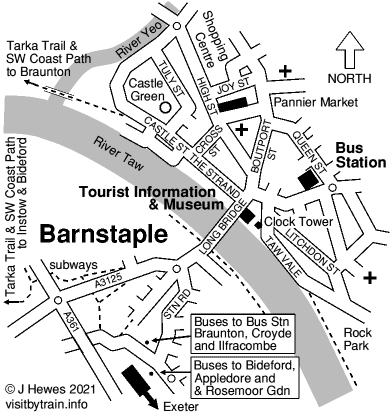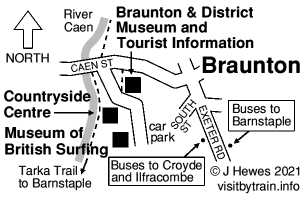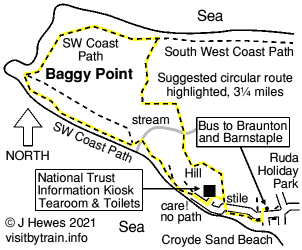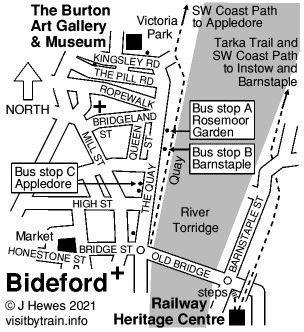Barnstaple is the largest town in North Devon and an important transport hub for the area with buses to Braunton, Ilfracombe, Bideford, Appledore, Westward Ho! and Lynton. The town centre and Bus Station (½ mile) are across the 13th century Long Bridge from the Rail Station but buses operate between them (M-S every 15 minutes, Sun & BH every 30 minutes).
Barnstaple is on the River Taw and was an important port until the harbour silted up. There are many fine buildings including the Victorian Pannier Market which still functions as a popular indoor market. The Victorian Clock Tower near the Museum was erected as a memorial to Prince Albert. A mound on Castle Green is all that remains of the Norman castle.
The South West Coast Path and the Tarka Trail both pass through Barnstaple. Much of the Tarka Trail is along the old railway lines to Braunton and Bideford, it was inspired by the route travelled by Tarka the Otter in the novel by Henry Williamson.
The railway line to Barnstaple is known as the Tarka Line and it is a scenic journey from Exeter, much of it near the River Taw.
www.southwestcoastpath.org.uk | www.tarkatrail.org.uk
The story of Barnstaple and North Devon with displays on Brannam's Pottery, Shapland furniture and
collections of the Devonshire Regiment and Royal Devon Yeomanry. Exhibitions programme. Café. Admission free.
Open M-S 1000-1630.
www.barnstaplemuseum.org.uk

Braunton is a large village in North Devon with three attractions to visit and frequent buses from Barnstaple.
Nearby Braunton Burrows, the largest sand dune system in England, can be seen from the bus to Croyde Bay (for Baggy Point, see below).
Bus 21/21A from Rail Station (also Bus Station) to Braunton, George Hotel, about 30 minutes journey.
M-S every 30 minutes, Sun & BH hourly. Operated by Stagecoach.
The Museum covers the agricultural, maritime, wartime and social history of Braunton. A highlight is the
working model of Braunton Station. Admission free, donations welcome.
Open M-S 1000-1600 (closes earlier Oct-May)
www.devonmuseums.net
Bus to Braunton, see above.
Information and displays on the North Devon biosphere including the coastal and farmed landscapes.
Events programme. Admission free, donations welcome.
Open Apr-Oct, M-S 1000-1600.
www.brauntoncountrysidecentre.org
Bus to Braunton, see above.
The history of British surfing which dates back more than two centuries.
Large collection of surfboards and surf related accessories.
Open Apr-Sep, TWThFSSu 1100-1500.
www.museumofbritishsurfing.org.uk
Bus to Braunton, see above.

An impressive headland at Croyde Bay with walks along the South West Coast Path. There are stunning coastal views
of the local surfing beaches and out to Lundy Island. Look for seals and porpoises as well as birds and wilflowers.
NT Information Kiosk in car park for walk leaflets. Tearoom (open weekends only in winter).
Open at all times.
www.nationaltrust.org.uk
Bus 21C from Bus Station (½ mile from Rail Station) to Croyde Bay, Ruda (where the bus turns and returns from the same stop), 43 minutes journey.
M-S hourly, Sun & BH 2-hourly summer only.
Operated by Stagecoach.
The Information Kiosk in the NT car park is only ¼ mile from the bus stop, then it is another mile along the
South West Coast Path to the tip of Baggy Point. The map shows a suggested circular walk of 3¼ miles from the bus stop,
allow at least 2 hours so you have time to admire the views. Other routes are available from the NT Kiosk.

Ilfracombe is a popular seaside resort with dramatic cliffs and rocky beaches including the Tunnels Beaches (see below)
and an attractive fishing harbour. There are many elegant Victorian buildings from town's development as a resort.
The 14th century St Nicholas Chapel on a high rock between the harbour and sea is used as a lighthouse, the steep climb
up to it is rewarded with great views of the harbour and town. The Verity statue overlooking the harbour is by Damien Hirst.
www.visitilfracombe.co.uk
Bus 21B from Rail Station (also Bus Station) to Ilfracombe, about 55 minutes journey.
M-S every 30 minutes, Sun & BH hourly. Operated by Stagecoach.
A network of Victorian hand-carved tunnels lead gently down to sheltered private beaches and a tidal Victorian bathing pool.
A great place for exploring the rock pools of Ilfracombe's rugged coast.
Open see website.
www.tunnelsbeaches.co.uk
Bus to Ilfracombe Wilder Road, Lidl, see above.
The museum houses a large collection of birds, butterflies and insect specimens from around the
world. South American ethnography. Local history.
Open Apr-Oct, Daily 1000-1700. Nov-Mar, TWThF 1000-1300.
www.ilfracombemuseum.co.uk
Bus to Ilfracombe Wilder Road, The Gardens, see above.
Living exhibits show the aquatic world of North Devon, from an Exmoor stream to the coast and
Lundy Island with its Marine Protected Area. Cafeé.
Open Easter-Oct, Daily 1000-1630.
www.ilfracombeaquarium.co.uk
Bus to Ilfracombe St James Gardens, see above.

Bideford is an attractive town on the River Torridge with an impressive 15th century arched stone bridge over the river.
It is a busy shopping centre with an historic Pannier Market. Antique shops can be found in the narrow streets
and alleyways (known locally as drangs) leading up from the quay.
Bus 21/21A from Rail Station (also Bus Station) to Bideford Quay, about 30 minutes journey.
Daily every 15-30 minutes. Other less frequent routes operate too.
Operated by Stagecoach.
Both Art Gallery and Museum, The Burton houses an art collection and hosts a programme of
contemporary exhibitions of national significance. Displays illustrate Bideford's famous people
and past industries including a Slipware Collection.
Open M-S 1000-1600, Sun 1100-1600.
www.burtonartgallery.co.uk
Bus to Bideford, see above.
The Railway Heritage Centre is at the former Bideford station site. Displays cover the history of the
closed railway from Barnstaple through Bideford to Great Torrington and beyond. Model railway. Café.
The Centre also manages Instow signal box on the Tarka Trail to Barnstaple.
Open Easter-Oct, SSu (Daily in school holidays) 1030-1600.
www.bidefordrailway.co.uk
Bus to Bideford, see above.

Appledore is a picturesque fishing village and sea port situated where the River Torridge joins the Taw estuary.
It has narrow winding streets and great views across the river to Instow.
Bus 21A from Rail Station (also Bus Station) to Appledore, about 45 minutes journey.
Daily hourly. Operated by Stagecoach.
The Museum covers Appledore's history as well as the wider maritime history of North Devon, including Viking raids,
shipbuilding and Second World War beach landings. The Museum's Georgian building was the home of several local ship owners.
Open Apr-Oct, Daily 1030-1700.
www.northdevonmaritimemuseum.co.uk
Bus to Appledore, see above.

A popular garden run by the Royal Horticultural Society. Situated in a valley, the Garden blends
formal and informal plantings. Features include a rose garden, arboretum, alpine house and herb, fruit and vegetable gardens.
Restaurant and Tearoom.
Open Daily 1000-1700 (1600 in winter).
www.rhs.org.uk
Bus 5B from Rail Station (also Bus Station) to opposite entrance, about 50 minutes journey.
Watch for the sign shortly after Great Torrington, there's no marked stop. Wait by the entrance for the return bus.
M-S infrequent. The bus operates via Bideford (see above).
Operated by Stagecoach.
Buses also operate from Crediton.
The gardens and historic parkland surround the 18th century Palladian Mansion House.
Highlights include water features, statues, follies and temples. Formal terraces near the house. Walled garden.
Panoramic views and woodland walks. Refreshment Kiosk and Tearoom.
Open M-F 1100-1600.
www.castlehilldevon.co.uk
Bus 155 from Bus Station (½ mile from Rail Station) to entrance shortly after Filleigh School,
24 minutes journey. Watch for the sign, there is no marked bus stop but there is space to wait for the return bus.
M-S hourly. Operated by Stagecoach.
Lynton is a small Victorian town with many 19th century buildings including the impressive Town Hall.
The seaside town of Lynmouth 500 ft below is at the gap in the high cliffs formed by the East Lyn and West Lyn Rivers.
Lynton and Lynmouth are linked by the Cliff Railway or a steep ½ mile walk.
The unusual Valley of the Rocks 1 mile west of Lynton is a dry valley with
interesting rock formations and stunning coastal scenery.
www.visitlyntonandlynmouth.com
Bus 309/310 from Rail Station (and Bus Station) to
Lynton Castle Hill Car Park, about 60 minutes journey, M-S hourly, also summer Sun & BH infrequent.
Operated by Stagecoach.
A small museum in Lynton's oldest house with a traditional rural kitchen, domestic and agricultural tools
and a collection of stuffed birds. The Museum covers the Lymnouth Flood Disaster of 1952.
Open see website.
www.devonmuseums.net
Bus to Lynton.
The world's highest and steepest totally water-powered railway.
Built in 1888 and still working today! Cliff Top Café.
Open Daily, see website for times of operation.
www.cliffrailwaylynton.co.uk
Bus to Lynton.

Displays and information on the surrounding Exmoor National Park.
Open Daily 1000-1700.
www.exmoor-nationalpark.gov.uk
Bus to Lynton (see above) then Cliff Railway or steep downhill walk, or bus to Lynmouth Coach Park (see Glen Lyn Gorge below).
See how the green energy of water power can be used. Exhibition about Lynmouth's 1952 Flood Disaster.
Gentle and more challenging walks in the wooded gorge with waterfalls.
Open see website.
www.theglenlyngorge.co.uk
Bus 309/310 from Rail Station (and Bus Station) to
Lynmouth Coach Park, about 70 minutes journey, M-S hourly, also summer Sun & BH infrequent.
Operated by Stagecoach.
A large London & North Eastern Railway layout modelled on the 1935-1940 period. Admission free, donations welcome.
Open Daily 1030-1730.
www.visitlyntonandlynmouth.com
Bus to Lynmouth Coach Park (see Glen Lyn Gorge).
It is a pleasant 2 miles walk through the lush wooded gorge of the East Lyn River to the beauty spot at Watersmeet
where there's a Tearoom in a 19th century fishing lodge. The gorge is a haven for wildlife with rare ferns and other plants. Admission free.
Open Tearoom Apr-Oct, Daily 1030-1700 (1600 Sep-Oct).
www.nationaltrust.org.uk
Bus to Lynmouth Coach Park (see Glen Lyn Gorge), then 2 miles walk.
An intimate and intriguing Regency house crowded with treasures from the last owner's travels
including model ships, tapestry, pewter and shells. Carriage Museum in stables. The estate includes informal gardens,
historic parkland, woodland and a lake. Tearoom.
Open Mar-Oct, Daily 1000-1600, House & Museum from 1100.
www.nationaltrust.org.uk
Bus 309 from Rail Station (and Bus Station) to
Arlington Court turn (watch for NT sign shortly after a hairpin bend, there's no marked stop), about 30 minutes journey,
then ½ mile walk. M-S infrequent and only suitable for a morning visit.
Operated by Stagecoach.
A narrow guage steam railway on a 1 mile section of the original line which closed in 1935.
Travel in Victorian carriages. Tearoom and picnic area. There are plans to extend the line.
Open see website for dates and train times.
www.lynton-rail.co.uk
Bus 309/310 from Rail Station (and Bus Station) to
Woody Bay station entrance, there's no marked stop, about 50 minutes journey. M-S hourly, also summer Sun & BH infrequent.
Operated by Stagecoach.